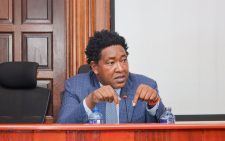Church must choose justice, not political proximity

In a country grappling with widespread corruption, youth unemployment, enforced disappearances, and a deepening crisis of public accountability, the last thing Kenya needs is a politicised pulpit.
The recent plan to upgrade the mabati church within State House into a more formal chapel, championed by a section of the clergy, is not just a symbolic move.
It is a dangerous shift that risks blurring the lines between spiritual leadership and state power, and it undermines the constitutional principle of religious neutrality.
Kenya’s church has long played a pivotal and prophetic role in the country’s political journey. It was the conscience of the nation during the fight for multi-party democracy, a haven when civil liberties were under attack, and a fearless voice when authoritarianism thrived.
But today, that moral authority stands threatened, not by government censorship or persecution, but by the church’s leaders who appear more interested in securing access to power than holding it accountable.
Let’s be clear: those clergy who are pushing for the formalisation of the State House chapel are not acting out of purely spiritual motivation. They are seeking political proximity and personal relevance in a time when the country needs bold, independent faith leadership more than ever.
By aligning themselves so closely with a regime facing immense public scrutiny over corruption scandals, unexplained deaths, and a heavy-handed response to dissent, these leaders are placing institutional interests above public good.
President William Ruto, to his credit, effectively used the church during his rise to power. He turned prayer events into campaign platforms, surrounded himself with bishops and pastors, and crafted a narrative that cast him as a divinely favoured leader. But there is a clear distinction between election-time optics and governance. The church, having played a central role in his political ascent, must now step back, not step further in.
What’s unfolding is not just an architectural upgrade of a church building; it is the entrenchment of a dangerous alliance. A faith that becomes too familiar with the State House loses its power to challenge injustice. Bishops who make themselves comfortable within the corridors of power are no longer guardians of the people; they become gatekeepers of privilege. Moreover, the plan carries implications far beyond politics. It threatens interfaith balance in a pluralistic.

Accountability challenges
If Christian leaders are offered an institutionalised presence at the seat of power, it is only a matter of time before other faith groups demand their place. The move not only violates the spirit of secular governance enshrined in the Constitution, it risks inflaming sectarian competition, something Kenya cannot afford.
Faith leaders who seek favour from political regimes cannot, in the same breath, claim to speak truth to power. And right now, Kenya needs that truth more than ever. As young people are shot in the streets for protesting injustice, as journalists are harassed and activists disappear, as taxes rise while public services collapse, the church should be standing on the side of the oppressed, not dining with the powerful.
Where is the voice of the clergy in this moment of national crisis? Where are the bold statements condemning state violence? Where are the calls for transparency, justice, and reform? A section of bishops have instead chosen silence or worse, complicity. Their energy is now spent justifying their proximity to power rather than confronting the rot that threatens the very soul of this nation.
Their silence is not neutral. It is an endorsement.
This is the time for a moral recalibration. The church must remember its calling: to comfort the afflicted and afflict the comfortable. To challenge kings, not crown them. To raise a prophetic voice in defence of the poor, not whisper blessings to those who exploit them.
Kenya is watching. And Kenyans are growing weary of choreographed prayers that ignore the pain of the people. If the clergy continues on this path, it risks becoming irrelevant — a ceremonial presence at State functions, but absent where it matters most: in the lives of the people.
We do not need a cathedral at the State House. We need courage in the pulpits. We need a church that roars with the cries of the suffering, not one that sings hymns for the elite.













